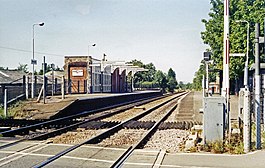Elmswell railway station
| Elmswell |
|
|---|---|

Elmswell railway station in 1991
Photograph by Ben Brooksbank |
|
| Location | |
| Place | Elmswell |
| Local authority | Mid Suffolk |
| Grid reference | TL989639 |
| Operations | |
| Station code | ESW |
| Managed by | Abellio Greater Anglia |
| Number of platforms | 2 |
| DfT category | F2 |
| Live arrivals/departures, station information and onward connections from National Rail Enquiries |
|
| Annual rail passenger usage* | |
| 2011/12 |
|
| 2012/13 |
|
| 2013/14 |
|
| 2014/15 |
|
| 2015/16 |
|
| History | |
| 24 December 1846 | Station opens |
| 12 December 1964 | Closes to goods |
| National Rail – UK railway stations | |
| * Annual estimated passenger usage based on sales of tickets in stated financial year(s) which end or originate at Elmswell from Office of Rail and Road statistics. Methodology may vary year on year. | |
|
|
|
Elmswell serves the village of Elmswell in Suffolk, England. The station, and all trains serving it, are today operated by Abellio Greater Anglia.
The Ipswich and Bury Railway Company (I&BR), was formed to build a line from Ipswich to Bury St Edmunds. Its Act of 21 July 1845 authorised capital of £400,000 and it shared many shareholders and directors with the Eastern Union Railway (EUR) who were in the process of building their line from Colchester to Ipswich. The companies also shared the same head office location in Brook Street, Ipswich.
The proposed line was 26.5 miles long, with intermediate stations at Bramford, Claydon, Needham, Stowmarket, Haughley Road, Elmswell and Thurston.
The ground breaking ceremony took place in Ipswich on 1 August 1845 where twelve local worthies (including the mayor of Ipswich, engineer Peter Bruff and John Chevallier Cobbold) each filled a wheelbarrow with soil. Building the line was challenging with problems at Ipswich with tunnel construction and at Stowmarket where the local marsh swallowed up a lot of material with test probes finding the bog was 80 feet deep!
On 26 November 1846 the first test train ran to a temporary station at Bury St Edmunds with stops at most stations on the route with the inevitable lavish celebrations. The official opening followed on 7 December 1846 when a special train ran from Shoreditch (later Bishopsgate railway station) to Bury. The Board of Trade inspection took place on 15 December 1846 and the line opened for traffic on 24 December.
The GER added a waiting room and some toilets on the up platform.
The Woolpit Brick Company operated on a site 1.25 miles south of Elmswell station. Initially a horse-worked narrow gauge tramway operated running along existing roads, to exchange sidings on the south side of the station. On 6 June 1920 a standard gauge line opened slightly to the east of the narrow gauge line on a purpose built alignment to the edge of Elmswell and thence via some street running to the station goods yard. The lease for this line was only 14 years and this duly terminated in 1915 after which the stock was auctioned on 23 September 1915 and the line lifted during 1916. The line operated three steam locomotives during its short life including a former Jersey Railways 2-4-0T called "Haro Haro". (photo).
...
Wikipedia
